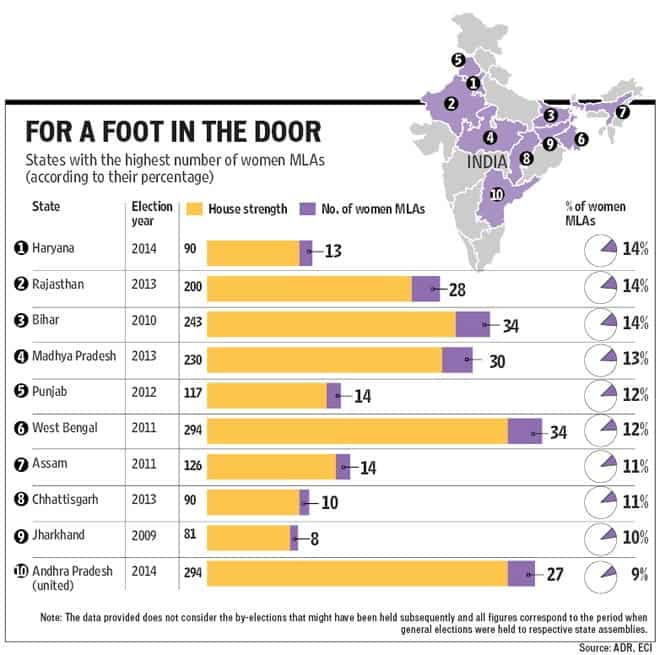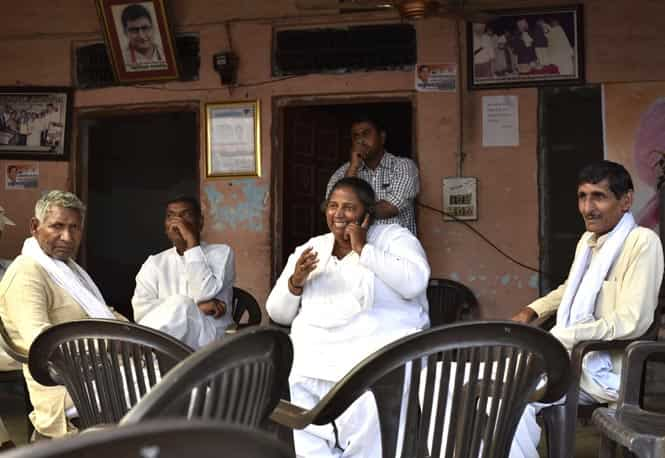Rise of women MLAs: Is Haryana's glass ceiling cracking?
With 13 women MLAs in the Haryana assembly, have political parties really become inclusive or is it just a one-time affair? HT talks to five of them -- Seema Trikha, Prem Lata, Shakuntala Khatak, Kavita Jain and Naina Singh Chautala -- to take stock.
The newly formed assembly in Haryana has 13 women MLAs - the maximum in the history of the north Indian state since it first witnessed assembly polls in 1965. This is an achievement for the state infamous for its patriarchal and feudal setup where women have no say in the affairs of the family and outside.


There are 879 women for every 1,000 men in the state against the national average of 927 to 1,000. According to the 2011 census, about 72 per cent of the population in rural Haryana is literate. This includes 60 per cent women.
"Considering that this has been an extremely male-dominated setup for decades, these 13 MLAs are a sign of the changing times. This was not expected earlier and should be hailed," says Daulat Ram Chaudhry, a Haryana-based social activist and retired Delhi University professor. Out of the 13 MLAs elected this year, eight are from the BJP, three from the Congress and one each from the Indian National Lok Dal (INLD) and the Haryana Janhit Congress (HJC). A total of 116 women candidates were in the fray this year for 90 seats across the state. The Congress fielded 10 women candidates and 16 were from the INLD. The BJP gave tickets to 15 women; the Bahujan Samaj Party to six and the HJC to five. Prior to the latest polls, the highest number of women MLAs sent to the Haryana assembly was 11 in 2005.
Also read:
Women activists nevertheless strike a contrarian note. "Only 13 MLAs out of 90, does not reflect a shift in women's place in the power structures of the state," says Savita, state joint secretary, All India Democratic Women's Association (AIDWA), Haryana. "Parties give tickets to women from seats where the chances of winning are grim. And majority of them are proxy for men in the family," she adds. Savita's stand is borne out by the fact that around six months ago, soon after municipal elections, the state administration faced a peculiar situation when husbands of councillors wanted to ensure they participate in all crucial meetings.
But what is undoubtedly happening is the repeat victories of women candidates. Renuka Bishnoi of HJC, Santosh Chauhan Sarvan and Kavita Jain of the BJP, Kiran Choudhry, Geeta Bhukkal and Shankuntala Khatak of the Congress have all been elected for the second time.
Seven candidates who made their debut as legislators in the 2014 assembly elections include Rohita Rewri, Santosh Yadav, Prem Lata Singh, Latika Sharma, Seema Trikha, and Bimla Chaudhary, all from the BJP; and Naina Singh Chautala of the INLD.
In 1996, the state had fielded 93 women candidates, of which only four were elected. It's certainly been a long road travelled since.
Politics defies gender
Seema Trikha
Constituency: Badhkal, Party: BJP
Gender factor ends when you are in politics," says 47 year old Seema Trikha, a first- time MLA in Haryana. In what is seen as the effect of the Modi wave in the state, Trikha defeated Congress veteran Mahender Pratap Singh by over 35,000 votes from Badhkal constituency. "My contenders belonging to other parties also were all men. My victory shows that gender does not matter if people have faith in you," says the qualified lawyer who is also known in her constituency as a social worker active on gender issues.
Trikha was a councillor between 2005 and 2009 and served as the president of the BJP's women wing in Faridabad, Haryana.
She admits that the notion of Haryana as a patriarchal and feudal set up is partially correct. Although in minority, there are families which encourage women to get educated and employed, she says. "If something wrong has been happening for decades, you cannot expect it to change overnight. Societal change is a slow process. The good thing is that it has started happening in Haryana," says Trikha, citing examples of Kalpana Chawla, late Indian- American astronaut and BJP leader Sushma Swaraj, who hail from Haryana.
She believes that the prime minister Narendra Modi's Independence Day address from Red Fort in which he advised parents to groom their male children so that they are sensitive towards women, would go a long way in the betterment of the country's women. "During her upbringing, a girl child is told about good touch, bad touch; when to be back in the house and how to protect herself. But no grooming is given to the boys in the family regarding how to behave with women when they go out."
Being a woman from a middle class family in Faridabad, Trikha says she has seen how various issues related to governance- employment, inflation, corruption- affects the woman in the family. "If there is inflation and the man cannot afford household items the way he was doing earlier, he asks the woman to adjust or make do with whatever he has got. It is her job to manage," she says.
Does she turn to men of the family for crucial decisions? "At times, I do." On women being proxy to males in the family, in the context of politics, she says. "Your own caliber dictates whether you will consult men in the family or party or not."
In politics, by chance
Kavita Jain
Constituency: Sonepat, Party: BJP
(Saumya Khandelwal/HT Photo
In October 2009, the Haryana unit of the BJP dropped its candidate from the Sonepat assembly constituency, Rajiv Jain, for the state assembly elections as a case against him relating to disproportionate income was pending in the Punjab and Haryana High Court. Jain, who was also the spokesman of the party's state unit, was replaced by his wife, Kavita Jain. She won that election and the latest one, the result of which was declared last Sunday.Other than her husband, the man Kavita observed closely in politics was her father, Surendra Kumar Jain, former BJP district president, a loyalist of former Haryana deputy chief minister Mangal Sain. "Much before I entered into active politics, I was attuned to the culture politicians are used to," says Jain, adding that it is rare for the women of Agrawal family, taking up politics as a profession. She believes that the situation of the girl child and women is generally grim across the country and it is not fair to exemplify Haryana as a patriarchal society. "Yes, honour killings have happened here, but the condition is not rosy outside this state," says the mother of two.
Belonging to a political family, it is said that Kavita would not have entered into politics if her husband did not have to withdraw his candidature at the last moment and that he remote controls Kavita's work.
Kavita refutes it. She believes it is unfair to say that women act as proxy to males in the family and they cannot take their decisions. Male politicians, too, have advisors and who can be a better advisor than your better half, she says.
The biker MLA
Shakuntala Khatak
Constituency: Kalanaur, Party: Congress

(Saumya Khandelwal/HT Photo)Shakuntala Khatak defies the stereotypical image of a woman in Haryana, one who is mostly confined to household work and look up to the men in the family. A professional nurse, Khatak owns a 150 cc bike which she rode to visit patients working for the post graduate institute in Rohtak. She continued to be a bike freak when she got to contest the assembly election for the first time from Kalanaur seat (reserved) in 2009 and drove the bike across her constituency. As her supporters and loyalists, mostly men, line up to congratulate her at the party office, 47 years old Khatak says, "I was always liberated," says Khatak, who is considered close to sate Congress leader and former chief minister Bhupinder Singh Hooda.
Khatak grew up watching her elder brother who was a Congress worker and ticket aspirant. "I got attracted to power early in my life. While I pursued my nursing career, my interest in politics never reduced," she says, adding that women in Haryana need to be bold and aware of their rights if they want to have their say in family matters and outside. "They should not become rebels, but at least know what their rights are vis-a-vis to those of men in the family," she says, adding, that compared to a decade ago, the state of affairs is much better for women. "Would you have come to interview a woman MLA in Haryana, then?" asks Khatak.
It's her day in the sun
Prem Lata
Constituency: Uchana Kalan, Party: BJP

(Gurpreet Singh/ HT Photo)
In a war between two dynasties in patriarchal Haryana, a woman has emerged as the big slayer. Prem Lata defeated the scion of the Chautala family, Dushyant Chautala, from Uchana Kalan, a seat held by her husband Birender Singh for four terms before switching loyalty from the Congress to the BJP. Being older to Dushyant by 38 years, makes her "more politically experienced", she says.
"A wife does not inherit the political legacy as a blood relation but her foray into politics happens on the same day as her husband," she says. "She is the woman behind the man. She manages the back-stage. During the floods in Uchana, I would go to homes of victims with doctors and medicines. Had the BJP given the ticket to my son or daughter, who are blood relations of my husband, it could be called dynastic politics but a wife getting the ticket cannot be so bracketed." Daughter of an army officer and a graduate from Pilani in Rajasthan, Prem Lata says more women MLAs are a necessity in a state like Haryana which is still in the grip of patriarchy and where the social and economic status of women are "abysmally low".
"Many women in Haryana still are in purdah (veil). How can male politicians meet them or be their voice? If there are crimes against women, do men raise the matter in the state assembly? There are no toilets at home for them and no facilities at workplaces. There should be women MLAs to speak for women," she says.
Prem Lata may belong to one of Haryana's powerful political families but political lineage alone does not win elections, she stresses. "Education is changing mindsets and there is more acceptability for women politicians now. We will not let daughters be killed in the womb either under pressure from the mother-in-law or the husband," she adds.





